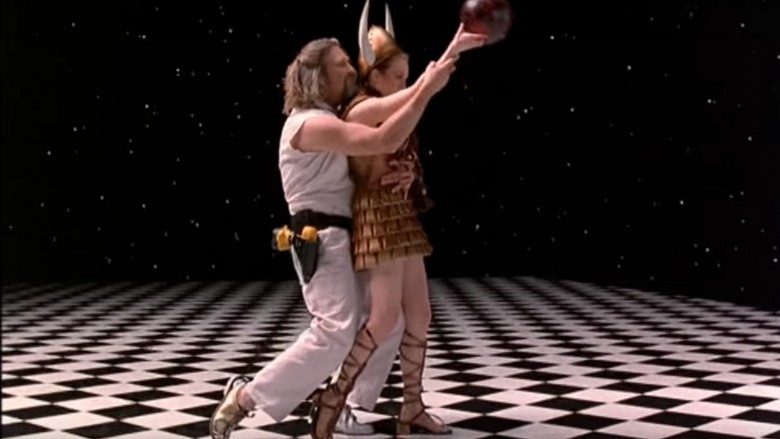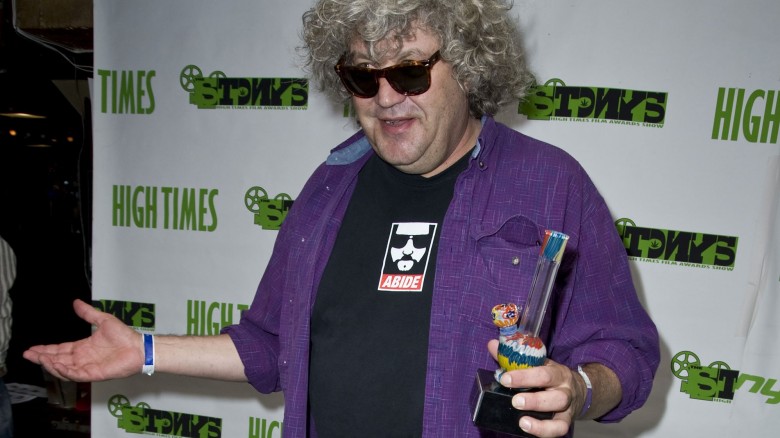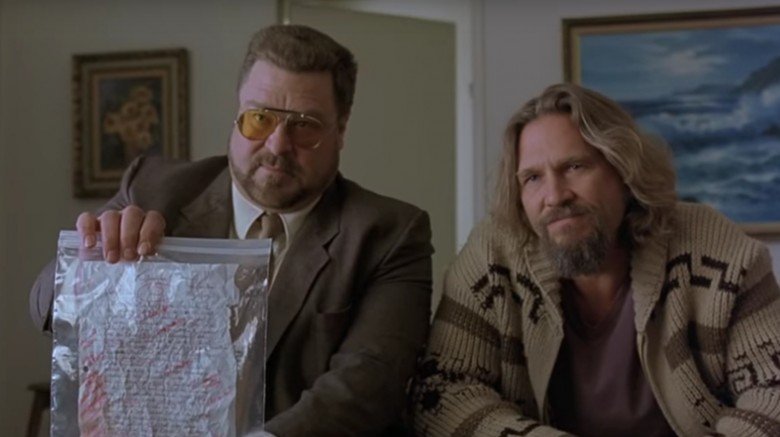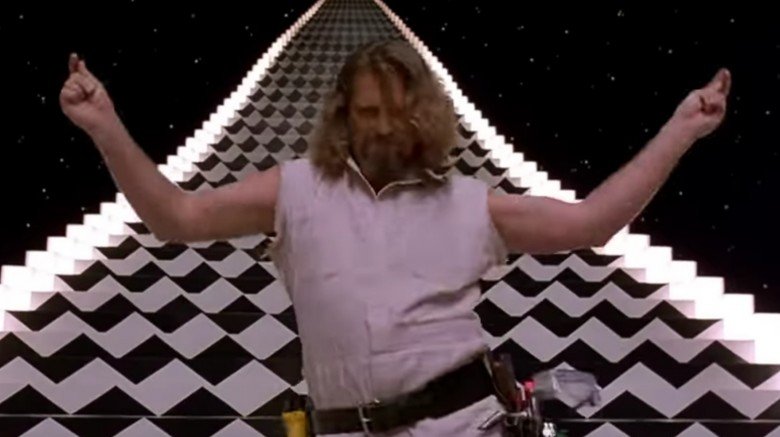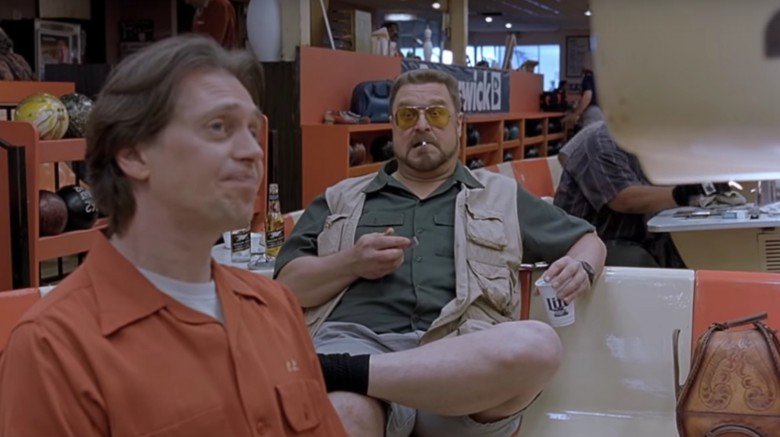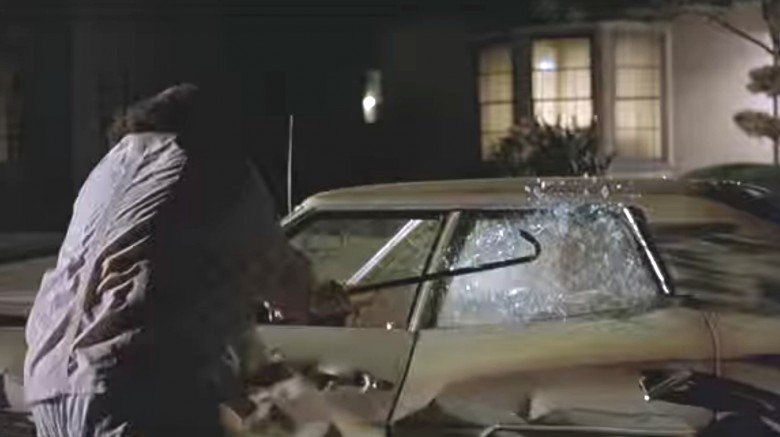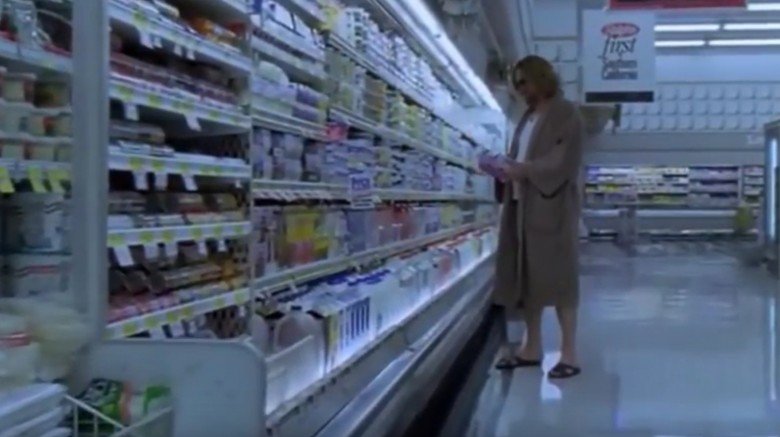The Untold Truth Of The Big Lebowski
"The Big Lebowski" is a quirky, charming cult film that dances a fine line between being completely random yet somehow still grounded. There are so many odd details about the 1998 Coen brothers comedy to obsess over that people are still discussing new theories, making new connections, and swapping trivia. Did you know, for instance, that the Dude's sweater is called a Westerly Cardigan and is based on a style created by indigenous Canadians? Did you know the "The Dude abides" quote is actually a butchered Bible verse? With this article, we're gonna dig a bit deeper, but try not to get too far out of our element.
The Dude never actually bowls at any point in the movie
One of the most grounding elements of an otherwise spiraling film of dream sequences, kidnapping, porn, and morose German philosophy are the scenes inside the bowling alley. They bring an earthy, working-class realness to the core protagonists. Oddly enough, however, at no point in the film is the "hero" (of sorts), the Dude, actually shown bowling. The closest we get is the dream sequence when he does a sort of "bowling dance" with a Viking costume-clad Maude, but even then, she is the one that rolls the ball.
Maybe it's a stylistic thing — a reflection of the Dude's passive nature. Even in the course of engaging with something he is passionate about, the events still simply happen around him, rather than being shaped at all by his will or action. Maybe Jeff Bridges doesn't actually know how bowling works?
The Dude is actually based on a real person
Jeff Bridges' performance of the Dude character has a sort of general "Hey, I know a guy just like that!" resonance, but believe it or not, he was based on a real person. They're not even subtle about it in the film, listing actual autobiographical details of Jeff Dowd, the man the character was based on, in an afterglow scene where Lebowski and Maude talk post-coitus.
Jeff Dowd really was one of the "Seattle Seven," an actual anti-war activist group during the '60s, and The Port Huron Statement was a real document authored by the group. The Metallica "Speed Of Sound" tour is fictional, however, and Dowd had no connection to that group at the time of the film. In a strange twist of fate, however, he did end up working on Metallica's documentary film Monster, and we'll leave it up to you to decide whether that plot twist was fortunate or not.
In real life, after his protest activism slowed down, Dowd was very active in the film industry as a producer and filmmaker, very unlike the slacker image presented in the film. Among his other work, he was the co-producer of FernGully: The Last Rainforest and... wait, what? FernGully? Really? Wild.
The homework found in the back seat of a stolen car plotline is a true story, as well
The "homework" scene, also known as the "Find a Stranger In The Alps" scene, thanks to the absurd censorship the film receives on basic cable, is one of the most iconic in the film. Once his stolen car is recovered, the Dude finds homework he believes belongs to the car thief in the back seat. This sends the Dude and Walter Sobchak (John Goodman) on a wild goose chase that winds up with two cars destroyed and the protagonists gaining nothing in their search for the truth behind the kidnapping/ransom. As bizarre as it sounds, it's also loosely based on a true story, and points to the real life person (or at least one of them) Sobchak was based on.
Walter Sobchak is an amalgamation of a few people the Coen brothers have known, but many traits were generously borrowed from the life of Paul Exline, the man who greenlit the 1987 Coen brothers film Raising Arizona. He did have a car stolen that he had to track down to the impound lot. He did find a kid's homework in the car, and he brought along his friend to interrogate the kid. He even put the homework in an evidence-like bag and wore a suit to more fully play the detective role. The house was even owned by an elderly man in an iron lung.
However, there's no mention by Exline of crowbars or his opinion of Alpine strangers, which is probably for the best. Some things are best left a mystery.
There is a legally recognized religion based on The Big Lebowski
In these trying times, if you are having a bit of a spiritual crisis, you could do a lot worse than converting to Dudeism. Founded by Oliver Benjamin, The Church Of The Latter Day Dude is a bit more complex than you may immediately suspect. Followers find as much solace in its blend of Taoist and Epicurean philosophy as they do in obsessively reciting lines from the film while ordering White Russians until you find someone else to sit next to at the bar.
As a legally recognized religion, ordained priests of Dudeism are able to perform legally recognized rites like marriages, and seem pretty progressive about who they will give their blessing to. So maybe even if you are not interested in converting, you could still keep them in mind for taking on any number of normally stuffy, traditional events you have coming up in a more casual, laid-back manner.
The word dude is used 260 times throughout the movie
This may be a bit of a cheat, because technically this is the chosen name of the protagonist, but when shown back-to-back in a viral supercut, the amount of times "dude" is said in the film seems absurdly excessive. The f-word is even more prominent in the film, rating the movie about halfway between Eddie Murphy: Raw and Goodfellas in frequency. Seriously. If you count variations of the f-word, like mother-etcetera, it actually outdoes Goodfellas. There's a supercut of that too, but it's a bit spicy for this site.
The film structure is that of a Raymond Chandler-style detective noir
The Big Lebowski has a very unusual narrative structure from first glance. It's not quite a buddy movie, it's not quite a comedy of errors, and there's all this very strange espionage going on by increasingly shady and bizarre characters double-crossing each other. It makes a lot more sense when you realize the film is essentially a classic detective film, except the protagonists are under-qualified, accidental detectives. This lends a lot of the humor to the movie, as the protagonists are completely over their head and have no idea how to navigate the machinations going on around them.
It has all the tropes. For instance, like detective movie protagonists, the Dude appears in literally every scene of the movie, just occasionally shoved so far in the background that he only "appears" as the van he is in through the window at the diner where the nihilists are ordering pancakes. The whole movie takes place in the vicinity of wherever he happens to be. There's even a scene where the Dude is accosted by a detective that acts as if he is playing some sort of 4-D chess spy game, rather than just constantly blundering into wherever the action happens to be. It's an incredibly clever reversal of expectations that even devoted fans of the film may miss.
The television show Veronica Mars was wall-to-wall Big Lebowski quotes
Rob Thomas — creator of the cult hit television show Veronica Mars not the singer of the Carlos Santana song "Smooth" — is a huge fan of The Big Lebowski. The show was chock-full of references to the show, and for good reason. The show featured an accidental, amateur detective and also took place in Lebowski's Southern California. Speaking to Vulture, Thomas insists that they would have snuck the entire movie into the show line-by-line if they could, but at least got their favorite lines in before the show was canceled after three seasons.
Steve Buscemi almost turned down his role for the exact reason the Coen brothers wanted him in it
On his first read of the Coen brothers script, Steve Buscemi was dismayed at the treatment his character Donny received. He just could not wrap his head around the abuse Donny's friend Walter constantly barraged him with, to the point where he became uncomfortable with the idea of performing in the film. Out of respect for the Coen's work, he went ahead and read the script through to the end. In the final act of the film, the way Walter attempted to protect and then later eulogized the fallen Donny moved him, and he was sold. Seeing the whole character arc play out, he realized a brotherly connection between the two characters that sealed the deal for him.
Incidentally, all that abuse that initially turned off Buscemi was absolutely intentional by the directors as an in-joke. Buscemi had previously played Carl Showalter in Fargo, and in that film his character was constantly talking. Just would not stop. The idea of having a character constantly screaming at Buscemi to shut up in their next film was deliciously funny to the Coens, who included it in the script.
The I hate the Eagles, man line was a blessing and a curse for the film
Despite being a fairly passive, laid-back character, there are a few things one definitely knows about the Dude. He loves bowling and White Russians, and he hates the Eagles. Jeff Bridges himself is much more apathetic, or at least much less apoplectic, about the band than his character, but that didn't stop him from getting chewed the heck out by Eagles singer/guitarist Glenn Frey several times at parties the two attended. Apparently Bridges and Eagles drummer Don Henley are on much friendlier terms, and the supposed slight hasn't affected how the two interact.
The line worked out well for the film itself, however. Music producer T Bone Burnett was really interested in ending the movie with Townes Van Zandt's cover of the Rolling Stones' "Dead Flowers," a song that was incredibly tricky to secure, since Van Zandt had died the year before. Turns out the rights to the song were owned by former Rolling Stones manager Allen Klein, who initially demanded $150,000.
The Coens invited him to watch an early cut of the film, and at the Eagles-disparaging line, Klein stood up in the middle of the showing and insisted they could just have the song for free. That's a way deeper burn against the Eagles than the line itself.
The exact car used in the film was in an X-Files episode
Throughout the film, it's not like the 1973 Gran Torino the Dude drives is in particularly great shape, and it gets worse as the movie progresses. The final indignity the car suffers, however, was reserved for years later. It made a brief appearance in the 1999 buddy-cop film Blue Streak, and then was wrecked while filming the 2001 X-Files episode "Salvage."
However, the car lives on in a 1/43 scale diecast model, so this isn't entirely a sad ending for the poor, beleaguered vehicle.
There was a short-lived store that sold exclusively Big Lebowski merchandise
Little Lebowski was a Greenwich Village store that sold nothing but The Big Lebowski-related merchandise, and it stayed open for a surprisingly long time doing exclusively that. Owner Roy Preston started out running a children's bookstore in the same location starting in 2007, but just could not get the level of business he needed to keep the bills paid. Realizing he was close to closing down, he went out on a limb and started stocking t-shirts for his favorite film. This brought in some new business, but he still struggled.
Jeff Bridges' 2010 Oscar win, and the resulting boost in interest in his films, was a godsend to Preston. His store finally in the black, it became a wall-to-wall shrine to the then more than twenty-year-old film. The film played on loop on a television inside, the store had a mini-bowling alley in back, and, as well as t-shirts, they also sold bobble-heads, cardboard cutouts of the characters and even rugs. You know, to tie the room together. Preston would even sell White Russians to customers stumbling in from nearby bars to help boost interest.
From 2011-2014, the store did really well, but eventually Preston had to close shop. He now sells Lebowski-related trinkets online, but it's not the same, man.
